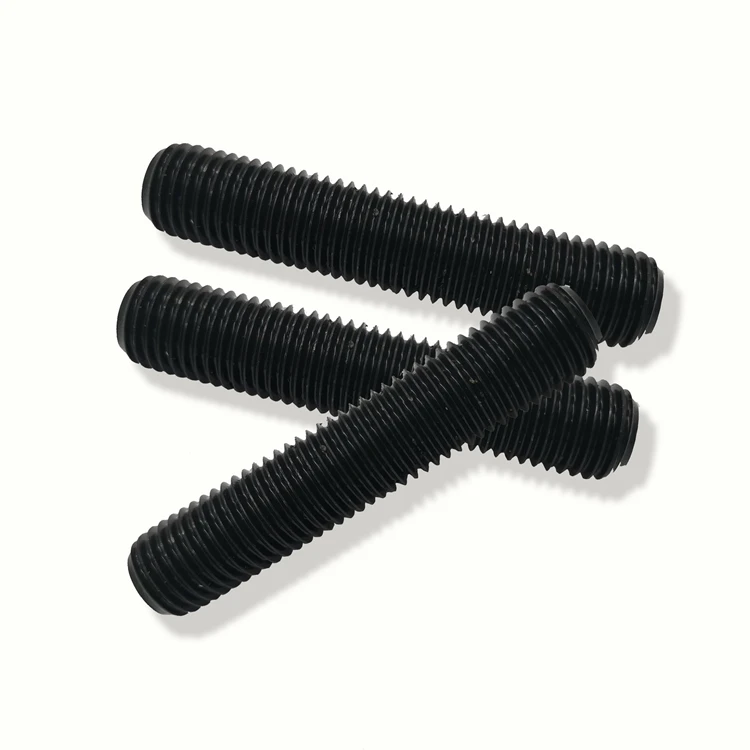oem ce certification din938 stud bolt
Nov . 04, 2024 21:58 Back to list
oem ce certification din938 stud bolt
Understanding OEM CE Certification for DIN 938 Stud Bolts
In the realm of manufacturing and engineering, the need for high-quality, reliable components is paramount. One such component that plays a crucial role in various industries is the stud bolt, particularly the DIN 938 stud bolt. This article aims to delve into the specifics of DIN 938 stud bolts and the significance of OEM CE certification, highlighting their importance in ensuring safety, quality, and compliance in manufacturing processes.
What is a DIN 938 Stud Bolt?
DIN 938 stud bolts are specialized fasteners commonly used in the construction and mechanical engineering sectors. The designation DIN refers to the German Institute for Standardization (Deutsches Institut für Normung), which sets forth standards to ensure quality and consistency in manufacturing. DIN 938 specifically outlines the dimensions and mechanical properties for stud bolts, making them suitable for high-stress applications.
Typically, a DIN 938 stud bolt comprises a cylindrical body with threads on either end, allowing for secure fastening in various applications. These bolts are extensively used in machinery, pressure vessels, and construction projects where high strength and reliability are non-negotiable.
The Importance of OEM CE Certification
OEM (Original Equipment Manufacturer) refers to the entity that produces parts and equipment for another company. When it comes to stud bolts, OEMs must adhere to stringent quality standards to ensure that their products perform effectively and meet safety requirements. The CE (Conformité Européenne) marking indicates that a product has been assessed and meets the EU safety, health, and environmental protection standards.
By acquiring OEM CE certification, manufacturers can prove that their DIN 938 stud bolts meet the established European standards, thereby ensuring quality and safety. This certification process involves rigorous testing and evaluation, ensuring that the products can withstand the challenges they will face in real-world applications.
oem ce certification din938 stud bolt

2. Enhancing Market Access
In the global marketplace, products that bear the CE marking are more appealing to international buyers. Many countries recognize the CE mark as a symbol of quality and compliance, which can lead to enhanced market access. For manufacturers of DIN 938 stud bolts, obtaining OEM CE certification can expand their reach into European markets and beyond. This certification reassures customers that the products they are purchasing are reliable and safe for use.
3. Risk Mitigation
Utilizing uncertified fasteners can lead to significant risks, including structural failures, accidents, and injuries. OEM CE certification minimizes these risks by ensuring that all manufacturing processes are monitored and that the final product meets rigorous standards. This proactive approach not only protects the end-users but also safeguards the manufacturers from potential liability issues arising from product failures.
4. Building Trust and Reputation
In an industry where safety and reliability are crucial, having OEM CE certification can significantly bolster a manufacturer’s reputation. Clients are more likely to trust manufacturers that invest in certification and adhere to high quality standards. This trust can lead to increased customer retention, repeat business, and positive word-of-mouth advertising, which is invaluable in competitive markets.
Conclusion
In conclusion, DIN 938 stud bolts play a vital role in various sectors where reliability and performance are critical. Obtaining OEM CE certification is not just about compliance; it’s a testament to a manufacturer’s commitment to quality, safety, and excellence. For businesses looking to enhance their market presence and establish credibility, investing in certification is a crucial step. By ensuring that their products meet rigorous standards, manufacturers can protect their customers and build a reputable brand that stands the test of time. Thus, the combination of high-quality DIN 938 stud bolts and OEM CE certification can lead to safer, more efficient industrial processes, fostering growth and innovation within the sector.
Latest news
-
High-Quality Panel Stud Bolt Reliable Panel Stud Bolt Factory & Suppliers
NewsJul.08,2025
-
High-Precision Fine Thread Locknuts Manufacturer & Supplier Custom Solutions
NewsJul.08,2025
-
PH Imperial Stud Bolt – High Strength Fasteners from Leading Supplier & Factory
NewsJul.07,2025
-
High-Quality Allen Wrench Bolts Leading Factory, Company & Suppliers
NewsJul.07,2025
-
Wholesale Ball Stud Bolt - High Quality Supplier & Factory Price Reliable Wholesale Ball Stud Bolt Company
NewsJul.06,2025
-
High-Strength Alloy Bolts Manufacturer & Supplier Quality Alloy Fasteners Factory
NewsJul.06,2025
